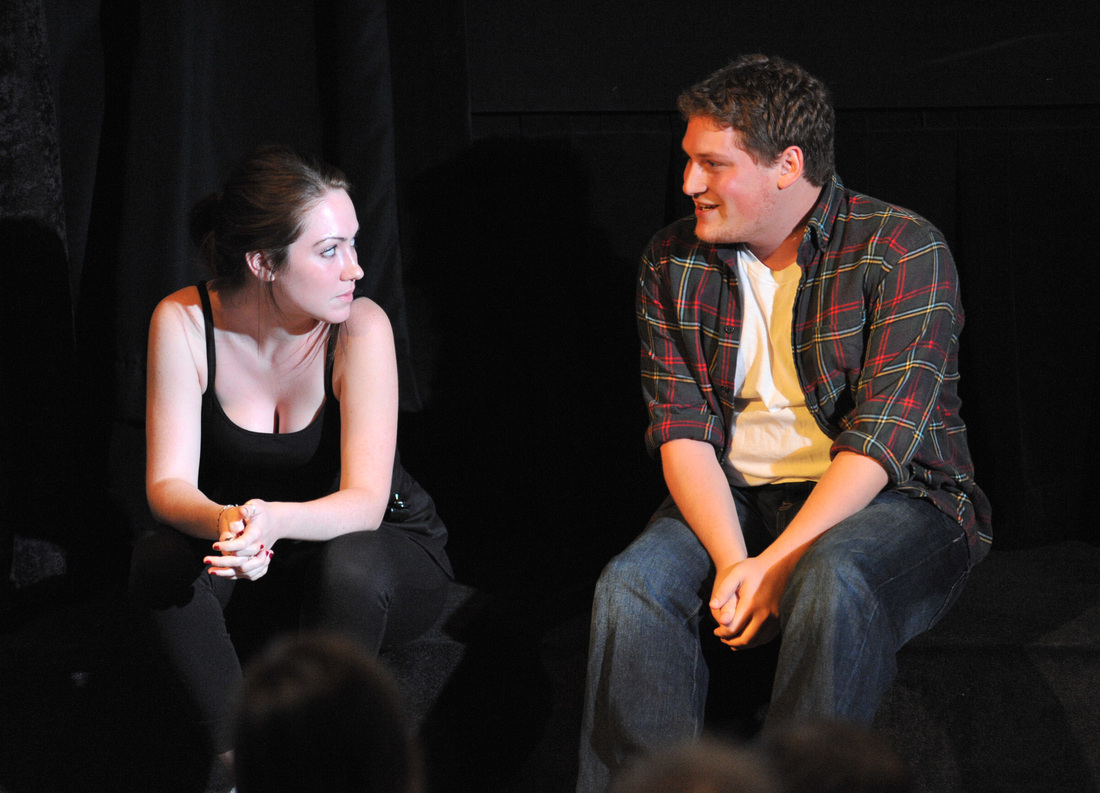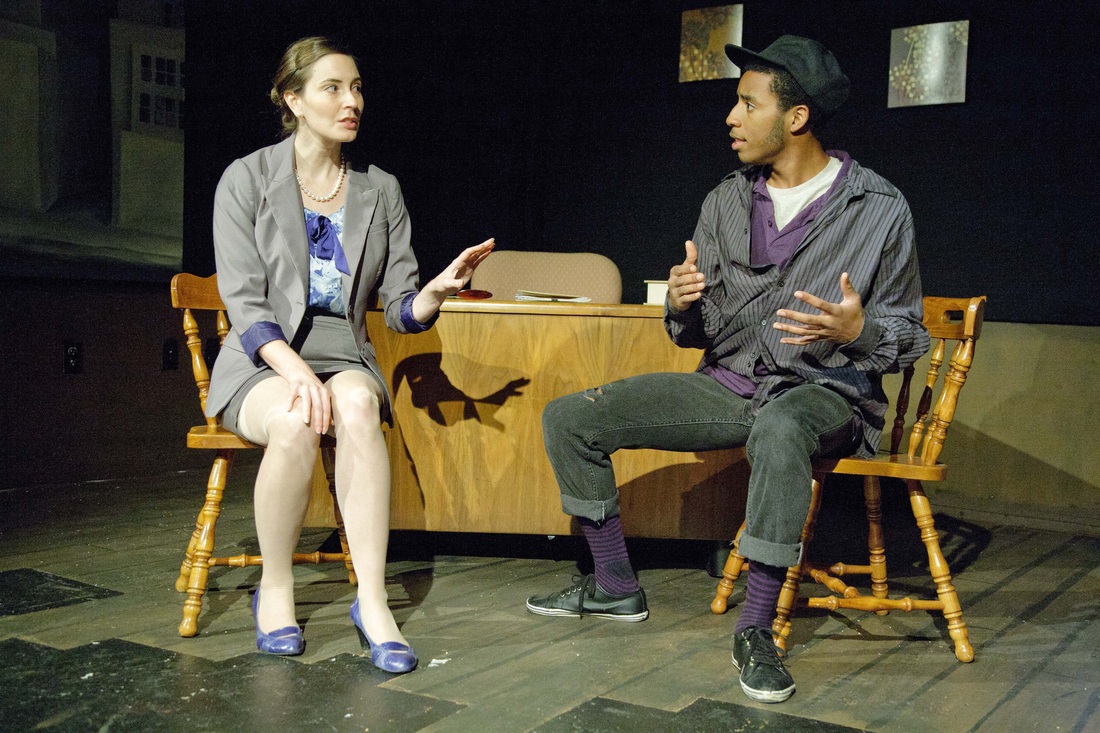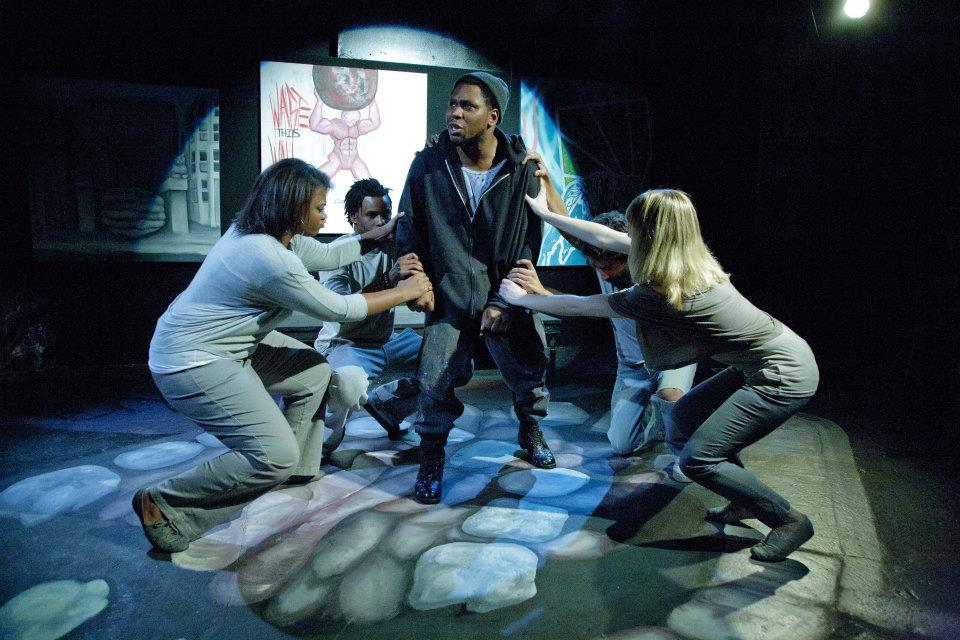|
JACQUELINE LAWTON: Why did you decide to get into theatre? Was there someone or a particular show that inspired you?
MEGHAN LONG: My first theatrical experience was my stage debut in grade school (2nd or 3rd grade, I think) as one of the aunt’s in James and the Giant Peach. I was a ham as a kid and loved performing on stage. My love of the stage spotlight continued through college and it wasn’t until I assumed the role of Executive Producer of a student theatre group my senior year at GWU that I realized there was a business to theatre. The story of my current producing and dramaturgical life is how it often happens: it was a decision not to work at a museum curatorial internship that landed me at Studio Theatre the summer after my junior year in college; that internship led to an internship with Jeffrey Herrmann, the managing director at Woolly; which, in turn led to a job at Round House, where I met Jessica Burgess and was introduced to new play development and dramaturgy with Inkwell. I consider Jeff, at Woolly, to be a mentor and a big influence on why I chose to pursue management and producing; equally as important, Jessica Burgess (and the entire Inkwell team!) has been my biggest influence for sparking my love of new plays and continuing to grow in the new play process. I have a laundry list of plays that excite and inspire me, but I find that it’s individuals I’ve met along my way that have inspired and challenged me to do the work that I do. JL: How do you define dramaturgy? Or explain to people the work that you do? ML: I relate the role of the new play dramaturg to that of a therapist. I listen, respond, and ask a lot of questions. Usually when I mention I’m a dramaturg I get a response along the lines of, “a drama-what?” I just say it a little slower making sure to pronounce each syllable: a dra-ma-turg. I think most people think it’s a theatre word I made up, but isn’t it a great word? And, it’s an even better role to play in the development process of a new play. JL: How long have you lived and worked as a dramaturg in DC? What brought you here? Why have you stayed? ML: I lived in DC for eight years and worked as a DC-based dramaturg for about four years. Initially, I moved to DC to attend The George Washington University for undergrad and stayed because I love the city. I was very fortunate to intern at both Studio Theatre and Woolly Mammoth Theatre Company during college and then after graduation worked at Round House Theatre right up until I moved to New York this past summer. I made the move to New York to pursue my MFA in Theatre Management and Producing at Columbia University’s School of the Arts. I still consider myself part of the DC-theatre community in spirit and try to visit as often as possible. (And, I’ll be back with a new project in the summer so it will be like I never left!) The DC theatre community is extremely welcoming and open and it’s this supportive network and community that allows for the creation of new and exciting work. JL: If your work as a dramaturg doesn’t pay the bills, what else do you do? How do you balance this work with your dramaturgy? ML: I was very fortunate that during my time in DC my “day job” was a job in theatre. I worked for four years at Round House Theatre: two years as the artistic administrator and two as the development assistant. For me, the biggest challenge was balancing my job at Round House, dramaturgical work with Inkwell, and producing with Junesong. I’ve always been the type to have multiple projects going on at once and I’ve learned my strengths and weaknesses when it comes to taking on new projects. I also eventually learned it was okay to say no to a project; I don’t have to do everything right now! The great part of my balancing act was that many of my projects overlapped and I could wear my administrator hat in relation to my dramaturgy work and my dramaturg hat with respect to my producing work. JL: What skills and traits do you feel a successful dramaturg should have to support the development of a new play or a production? ML: Patience, active listening, being generally curious helps too. In new play development it’s all about the playwright and the work she has created; it’s important to figure out what the playwright needs, wants, and those things that the playwright doesn’t know she wants yet. I think you need to be an advocate for the playwright; sometimes a reassuring presence in the room, and at other times the playwright bodyguard. I always make sure the playwright knows that she shouldn’t have to answer anything that she doesn’t want to yet. And, full disclosure - I don’t have any formal training as a new play dramaturg; I learned everything from listening to others during the process in the room. I credit everything I know to being a successful dramaturg to Anne McCaw; she was – and still is – instrumental in my growth as a dramaturg. Thanks, Anne! JL: What is the greatest part of being a dramaturg? What has been your most difficult challenge? ML: Being a collaborator is the best part of a being a dramaturg. I love the rehearsal room. There isn’t much that is better than listening to words jump off the pages. Inkwell describes their Showcase Readings (20-minute excerpts of plays) as first dates and that is exactly how I feel with each new project. It’s scary and can be challenging, but ultimately rewarding. And hopefully everyone walks away really wanting that second date. My most difficult challenge was finding my voice in the process when I first started as a dramaturg. It can be a delicate position to be in, to not only advocate for the playwright but also advocate for the important role that a dramaturg can play in the development of a new work. You have to know why you’re in the room and how you’re contributing to the conversation and development. JL: Who are your favorite playwrights? What is it about their work that inspires or draws you to them? ML: I’m never one for picking favorites, so I’ll go with all of the playwrights I’ve worked with through Inkwell. Inkwell-y playwrights write plays with big hearts, broad imaginations, and they all take huge risks. Language that is unique and just a little off – in a way that you can’t quite put your finger on it – really excites me, too. JL: DC audiences are … ML: Intelligent and engaged. JL: DC actors, designers and directors are .. ML: All artists whom I admire. JL: DC playwrights are … ML: The BEST! I’m biased, but they really are. DC playwrights are innovative, curious, funny, political, and some of my best friends. JL: DC critics are … ML: Engaged in the conversation. JL: How do you feel the DC theatre community has addressed the issues of race and gender parity? How has this particular issue impacted you and your ability to get your work produced on the main stages? ML: The issues of race and gender parity are topics of national theatrical conversation and not unique to DC. I, along with other women in the theatre, would love to see more female playwrights represented on Broadway and in our not-for-profit institutions across the country. Wouldn’t it be great if in five years female playwrights wrote half of the plays on our stages across the country? I love to go back to statistics on this point, too: think about who are buying the tickets to theatre? Who is the one planning the girls night out and, more than occasionally, dragging her husband to the theatre? Women!! I don’t see this changing any time soon, either. So, if our theatregoers are mostly women, where are we represented on stage and in board rooms? I think there should be more women running our nations best and biggest theatrical institutions. As a young theatre professional, I aspire to produce on Broadway or run a large institutional theatre and I hope that by the time I see myself in such a position that the lens of gender parity will have shifted or will become obsolete. It’s 2013, why are we still having this conversation? Here’s a well-deserved shout-out to you, Jackie, for being a champion for women in DC theatre! JL: What advice do you have for an up and coming DC based dramaturg who has just moved to D.C.? ML: Stay curious and keep learning. Read as many plays as you can get your hands on. Reach out to those in the DC theatre community and have coffee and listen their stories. Go to readings, workshops, and see as much theater as you can. DC is a city with a rich history and wealth of arts and culture – take advantage of everything else in the city, too. I always remind myself that – even though we sometimes don’t like to admit it – there is a world outside of the theatre. JL: What's next for you? Where can we keep up with your work? ML: Although I’m based in New York, I’m continuing my work with Inkwell from afar. I’ll be working with Inkwell through the current open call for submissions. I am also producing a new project with Tim Guillot this summer in the DC Fringe Festival. Tim is adapting Mike Daisey’s The Agony and the Ecstasy of Steve Jobs into a musical that we are producing, under the auspices of Junesong, at the Capital Fringe Festival. We’re both really excited to premier the work in DC this summer! Stay tuned to @junesongarts for more info.
0 Comments
Your comment will be posted after it is approved.
Leave a Reply. |
My BlogI'm a playwright, dramaturg, and teaching artist. It is here where you'll find my queries and musings on life, theater and the world. My posts advocate for diversity, inclusion, and equity in the American Theatre and updates on my own work. Please enjoy!
Categories
All
Archives
June 2020
Reading List
|



